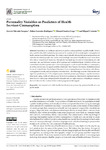Mostrar o rexistro simple do ítem
Personality Variables as Predictors of Health Services Consumption
| dc.contributor.author | Taboada-Vázquez, Antonio | |
| dc.contributor.author | González-Rodríguez, Rubén | |
| dc.contributor.author | Gandoy-Crego, Manuel | |
| dc.contributor.author | Clemente, Miguel | |
| dc.date.accessioned | 2021-06-29T15:08:22Z | |
| dc.date.available | 2021-06-29T15:08:22Z | |
| dc.date.issued | 2021-05-13 | |
| dc.identifier.citation | Taboada-Vázquez, A.; Gonzalez-Rodriguez, R.; Gandoy-Crego, M.; Clemente, M. Personality Variables as Predictors of Health Services Consumption. Int. J. Environ. Res. Public Health 2021, 18,5161. https://doi.org/10.3390/ijerph18105161 | es_ES |
| dc.identifier.issn | 1661-7827 | |
| dc.identifier.uri | http://hdl.handle.net/2183/28138 | |
| dc.description.abstract | [Abstract]: Expenditure on healthcare and services can be a serious problem for public health. Personality variables should be included as indicators to be considered when studying the consumption of health resources and their planning. This study aims to identify the psychological and psychosocial variables that identify people who can be considered high consumers of health resources versus those who barely consume such resources. The sample was made up of a total of 1124 subjects; one half were men, and one half were women, all of legal age and residents in Spain. A battery of tests was created that included a questionnaire of sociodemographic variables and of healthcare consumption, as well as several psychological variables (Zimbardo Time Paradox Inventory, Multidimensional Locus of Control Scale, Psychological Reactance Scale, Coping Responses Inventory, self-efficacy scale applied to health, and the Symptom Checklist-90-R). The following variables of the model were significant predictors (p _ 0.05): a negative past, a fatalistic present, psychological cognitive reactance, behavioral coping, health self-efficacy, and the level of somatization. Data from the statistical analyses show how to create a psychological profile of people who are high consumers of healthcare resources that will allow for the creation of intervention programs in this regard. | es_ES |
| dc.language.iso | eng | es_ES |
| dc.publisher | MDPI AG | es_ES |
| dc.relation.uri | https://doi.org/10.3390/ijerph18105161 | es_ES |
| dc.rights | Attribucion 4.0 Internacional | es_ES |
| dc.rights.uri | http://creativecommons.org/licenses/by/4.0/ | * |
| dc.subject | Environment and public health | es_ES |
| dc.subject | Health services | es_ES |
| dc.subject | Personality | es_ES |
| dc.subject | Personal health services | es_ES |
| dc.subject | Public health | es_ES |
| dc.subject | Medio ambiente y salud pública | es_ES |
| dc.subject | Servicios de salud | es_ES |
| dc.subject | Personalidad | es_ES |
| dc.subject | Servicios de salud personal | es_ES |
| dc.subject | Salud pública | es_ES |
| dc.subject | Medio ambiente e saúde pública | es_ES |
| dc.subject | Servizos de saúde | es_ES |
| dc.subject | Personalidade | es_ES |
| dc.subject | Servizos de saúde persoal | es_ES |
| dc.subject | Saúde pública | es_ES |
| dc.title | Personality Variables as Predictors of Health Services Consumption | es_ES |
| dc.type | info:eu-repo/semantics/article | es_ES |
| dc.rights.access | info:eu-repo/semantics/openAccess | es_ES |
| UDC.journalTitle | International Journal of Environmental Research and Public Health | es_ES |
| UDC.volume | 18 | es_ES |
| UDC.issue | 10 | es_ES |
| dc.identifier.doi | 10.3390/ijerph18105161 |
Ficheiros no ítem
Este ítem aparece na(s) seguinte(s) colección(s)
-
GI-ECRIM - Artigos [56]






